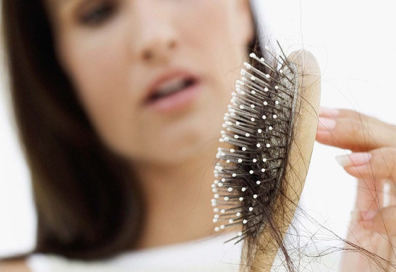
How Castor Oil May Help Support Hair Loss Due to Menopause

How Castor Oil May Help Support Hair Loss Due to Menopause
Written by: Heather Tanti R.P.N (non-practicing)
Medically reviewed by: Melanie Swackhammer B.A.
Est. reading time: 12 minutes
Let’s be honest; your hair can make or break your day at times. A bad hair day can have an impact on everything from your self-confidence, to the way others view you.
But beyond bad hair days lies the physical, mental and emotional aspects that come with the hormonal changes to your hair caused by menopause. If you find yourself in this transitional phase of life, you may be all-too-familiar with unwanted changes that may be happening to your hair, agreed?
Perhaps you’ve found yourself circling your local pharmacy for specialty shampoos and conditioners, hair mask treatments, etc., trying to find anything that will possibly help with menopause hair loss. Is this you? You’re not alone.
In this blog, you’ll discover the ins and outs of hair loss, hair thinning, and everything in between when it comes to menopause and your hormones. Plus, you’ll even uncover an all natural Castor Oil shampoo recipe that helps support healthy-looking hair. Let’s begin, shall we?
What is menopause?
Ever wondered why your once predictable body is suddenly reacting in unfamiliar ways? Menopause, a term shrouded in uncertainty, marks the end of a woman’s reproductive years—the finale of the menstrual cycle.
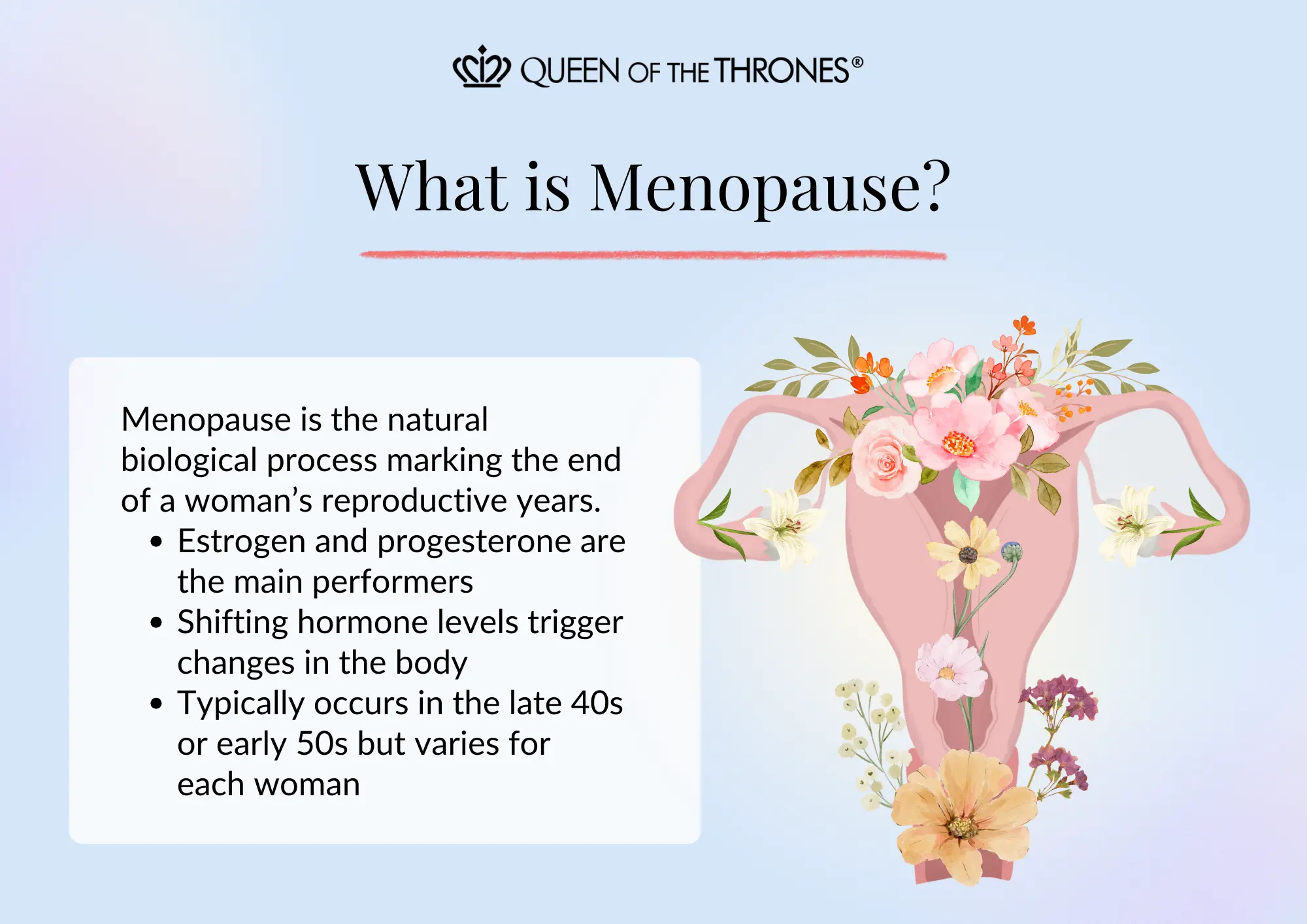
Picture it as the gradual dimming of lights on a long-running production.
This natural process typically hits in the late 40s or early 50s, unfolding at its own pace for each woman.1 Menopause is a hormonal tango, featuring estrogen and progesterone that triggers unpredictable changes within your body.
From hot flashes and mood swings to shifts in sleep patterns, menopause introduces an array of bodily changes, making the journey both unpredictable and challenging, especially when it comes to your hair.
Menopause hair changes
As women get older, they’re more likely to deal with hair loss or hair thinning, especially after menopause. Recent stats say that approximately 80% of women have hair loss by the time they hit 60 years old.2
Thinning hair from menopause
It’s important to note that not every woman goes through menopause hair loss, and the degree of transformation varies widely from person to person. Genetic factors, stress, diet, and other elements also play a role in this variation.3
But what about the emotional side to dealing with thinning hair? It’s perfectly normal to feel a bit disheartened or frustrated, but remember, you’re not alone.
To help navigate this phase successfully, it’s important to understand the science behind menopausal hair thinning.
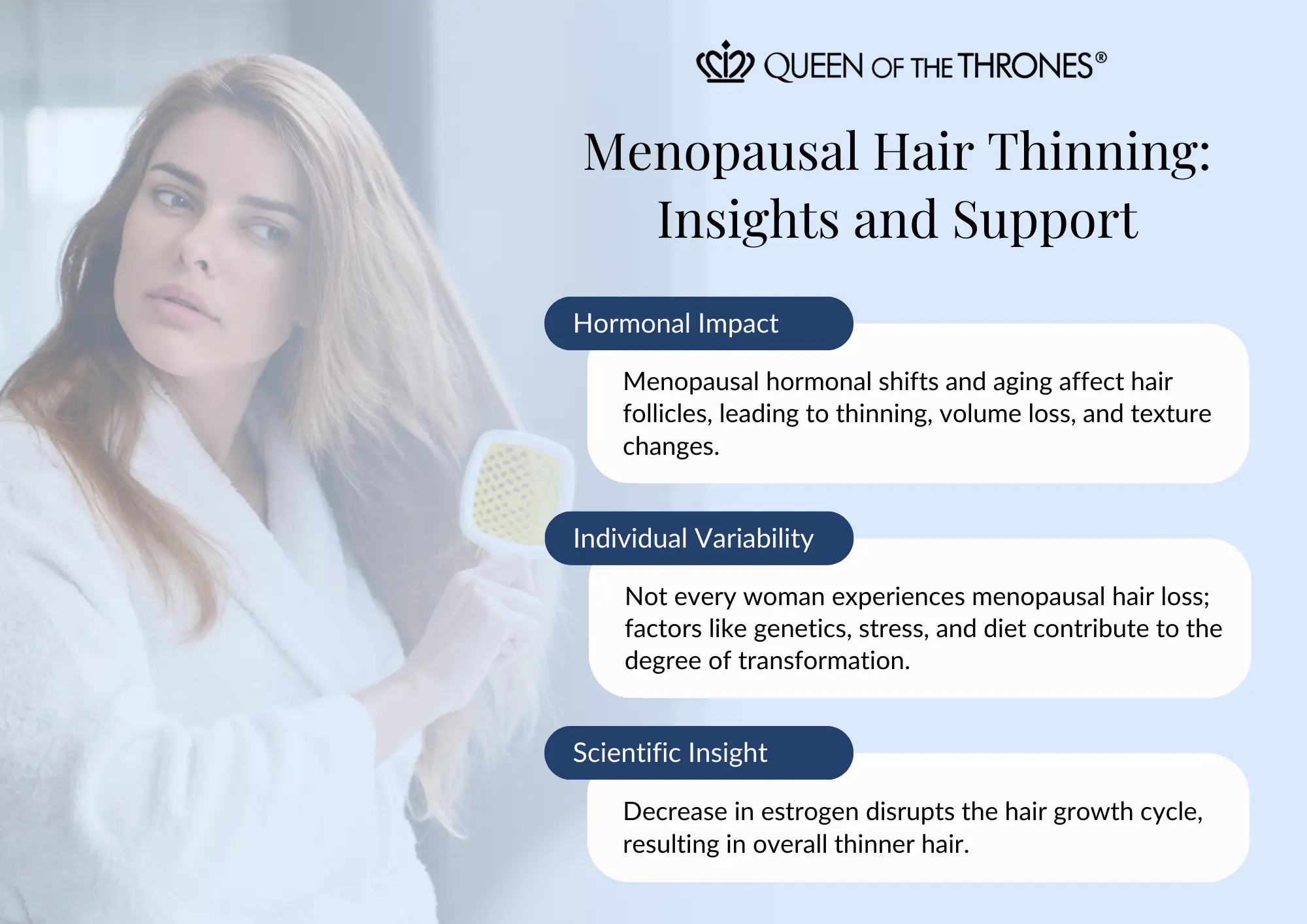
Essentially, as estrogen decreases, the hair growth cycle is disrupted, leading to more hair in the resting phase and less in the growing phase. This often results in overall thinner hair, and while it’s a natural part of the process, there are ways to help support it, so keep reading to find out!
Hair loss due to menopause
Having a midlife hair crisis? It might be menopause.
As estrogen levels decline during menopause, the delicate balance in hormonal fluctuations can impact various aspects of our well-being, including hair health. Estrogen plays an important role in maintaining the hair growth cycle, and when it begins to decline, it can lead to a condition known as female pattern hair loss.4
This form of hair less typically manifests as a widening part, or a noticeable decrease in overall hair volume.
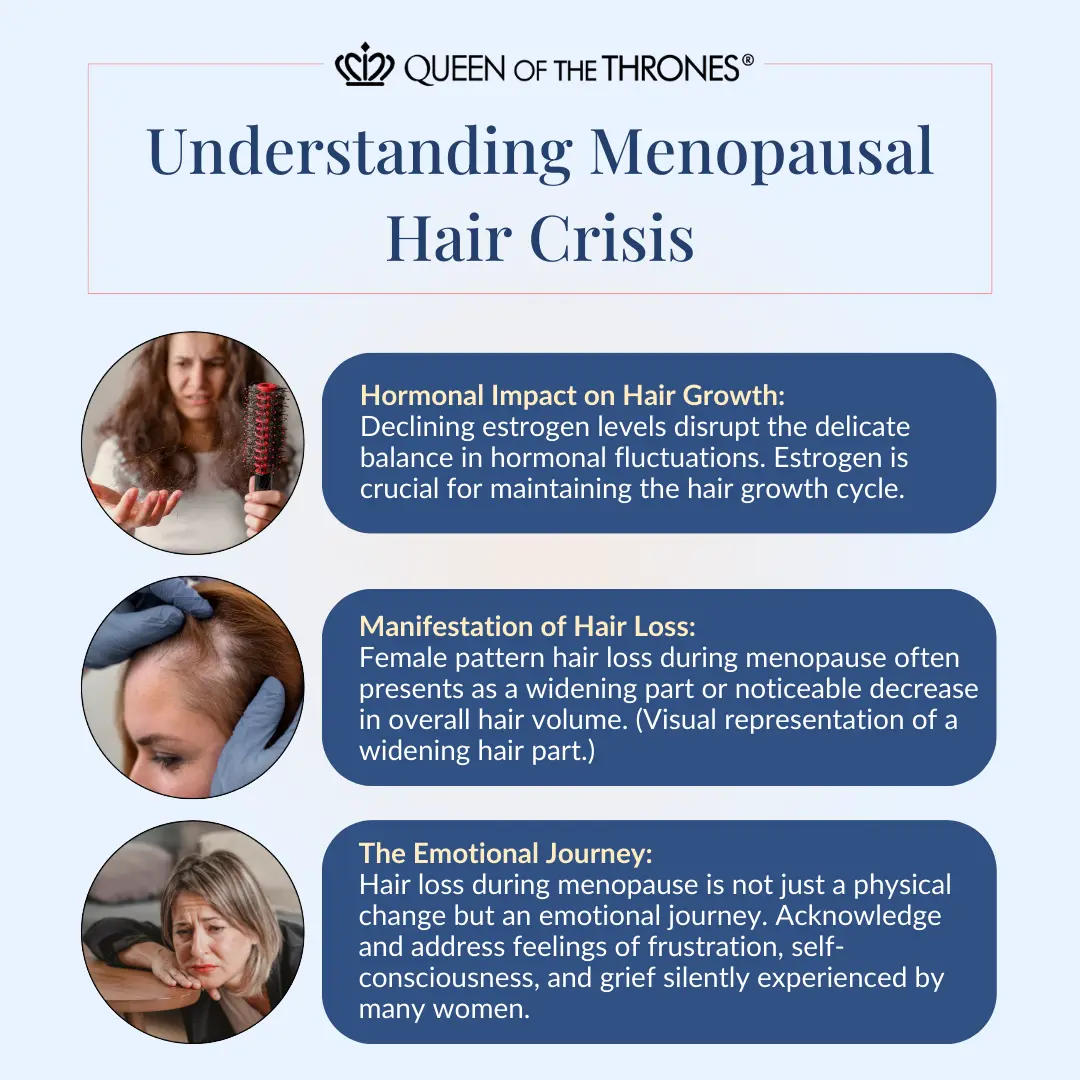
Hair loss is more than just a physical change, however. It’s an emotional journey that many women grapple with silently. Can you relate?
It’s essential to acknowledge these feelings of frustration, self-consciousness, and even grief that may accompany this transformative period in your life.
While there’s no one-size-fits-all approach for menopausal hair loss, there are natural options that may help support this phase that we will touch on soon.
Menopause facial hair
As if hair thinning and hair loss wasn’t enough to contend with, but now you’re sprouting facial hair? Is this normal?
Following menopause, women might undergo a decrease in estradiol (E2) levels, alongside an increase in testosterone (T) and low SHBG (sex hormone binding globulin) levels.
This hormonal change can result in subtle indicators of hyperandrogenemia (the excessive presence of the male sex hormones testosterone, androsterone and androstenedione in women), such as the gradual appearance of fine facial hair or an escalation in scalp hair loss.5
While unwanted facial hair is a natural part of the hormonal shifts that happen with menopause, the emotional impact can weigh heavy. Society often places pressure on women to have smooth, hair-free skin, which can make this change feel like an unwelcome departure from societal norms.
While challenging to navigate, it’s important to recognize that this is a shared experience among many women, and it does not diminish your beauty or femininity.
Can hair grow back after menopause?
Now, you may be wondering- Can hair grow back after menopause? Thankfully, menopause hair loss often isn’t permanent.
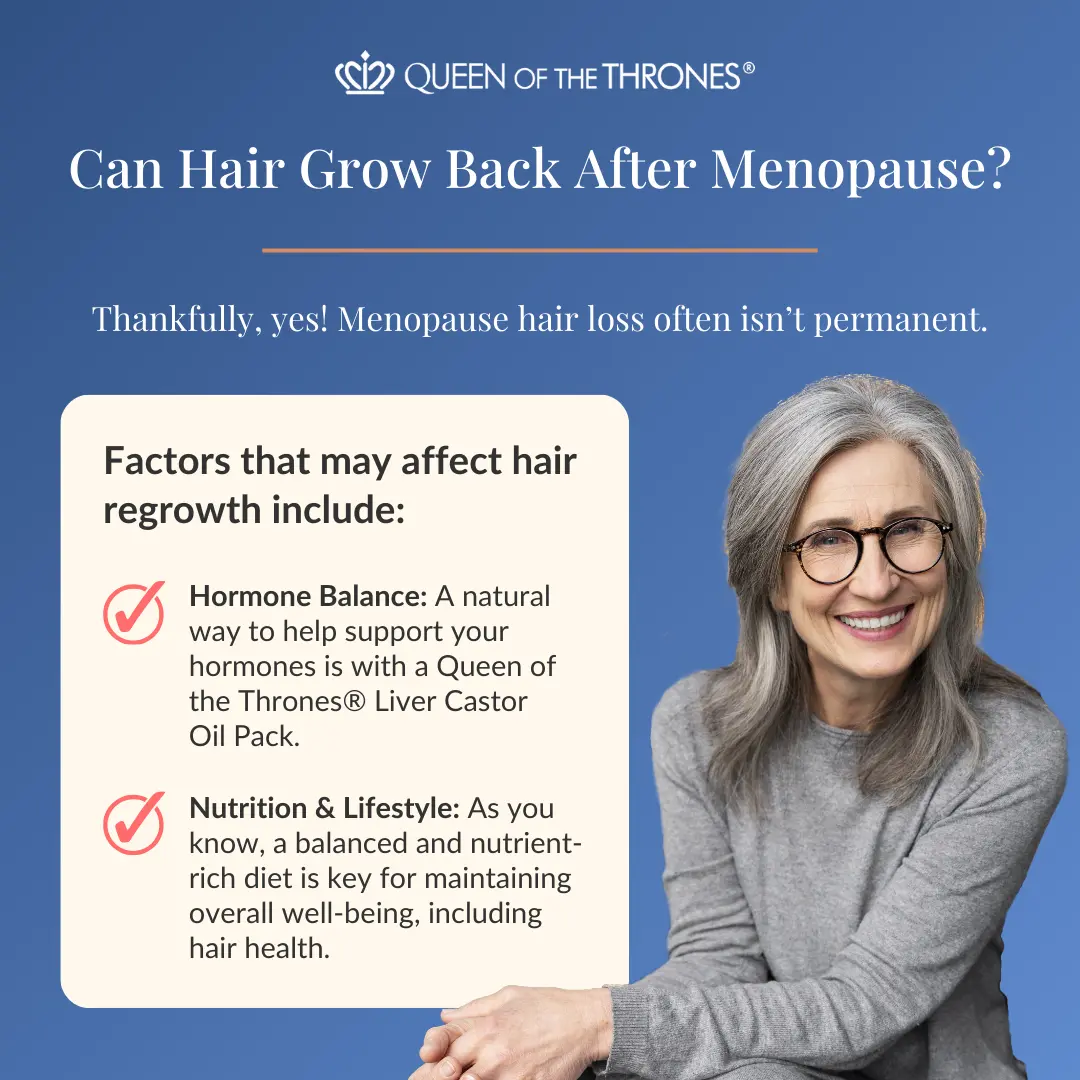
Factors that may affect hair regrowth include:
Hormone Balance: Maintaining hormone balance may possibly help create a more conducive environment for hair regrowth.6 Some ways to achieve hormone balance is through hormone replacement therapy.
Another natural way to help support your hormones is with a Castor Oil Pack, which you can wear over your pelvic and hip area.
You see, wearing a Castor Oil Pack over your pelvic region is thought to nourish your reproductive organs and support hormone balancing.
Would you love to know more? Well, Queen of the Thrones® has created an easy, less-mess way to do a pelvic Castor Oil Pack practice with their Pelvis & Hips Castor Oil Pack made with high quality organic materials and third-party tested, practitioner-grade Castor Oil..
Nutrition & Lifestyle: As you know, a balanced and nutrient-rich diet is key for maintaining overall well-being, including hair health.7 Ensuring your diet consists of vitamins and minerals such as biotin, iron, and omega-3 fatty acids is important.
While there are various ways to support hair regrowth after menopause, it’s important to approach this delicately and with realistic expectations. Factors such as genetic predisposition, overall health, and the duration of hair loss can influence the hair regrowth, meaning outcomes may vary from person to person.
Benefits of Castor Oil for hair
Have you ever wondered about Castor Oil for your hair? This age-old golden oil has been used for centuries as a natural approach for hair care, skin care, nail care, and overall wellness support.
So, what are some of the natural ways Castor Oil can become a wonderful ally for your hair during menopause?
- Hydration & Moisture: Menopause can bring about dryness, leading to limp, dull hair. Castor Oil’s rich, nourishing properties make it an excellent natural emollient, loaded with vitamin E and fatty acids8. This means it may be able to help lock in moisture, and bring hydration to your strands.
- Stimulating Hair Growth: Castor Oil has been thought to help stimulate hair growth. The ricinoleic acid it contains may help bring more circulation to the scalp, supporting the nourishing of hair follicles.
- Support for Hair Thinning: Hormonal shifts during menopause can contribute to thinning hair. Castor Oil’s nutrient-rich composition, including omega-6 fatty acids, supports hair follicles, potentially limiting the impact of thinning.9 Plus, regular scalp massage with Castor Oil may help encourage a healthier scalp environment, thanks to Castor Oil’s antimicrobial10A and anti-inflammatory11 properties.
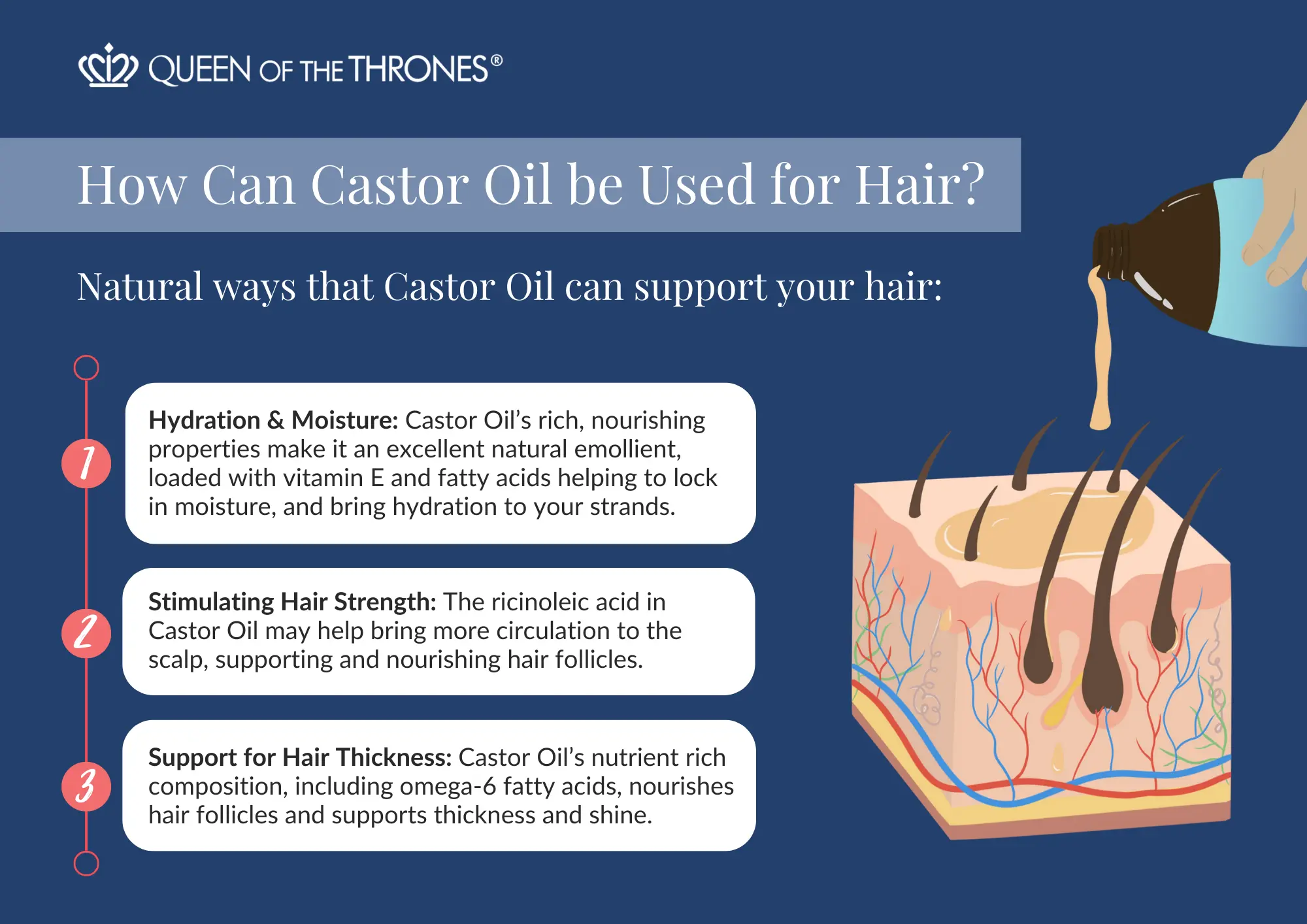
Sounds good, agreed? But not all Castor Oil is made equally. Always ensure your Castor Oil is 100% pure, hexane free, extra virgin and bottled in glass- like Queen of the Thrones® Golden Castor Oil!
Let’s go a little deeper into how Castor Oil may help support healthier looking hair!
Castor Oil for hair growth
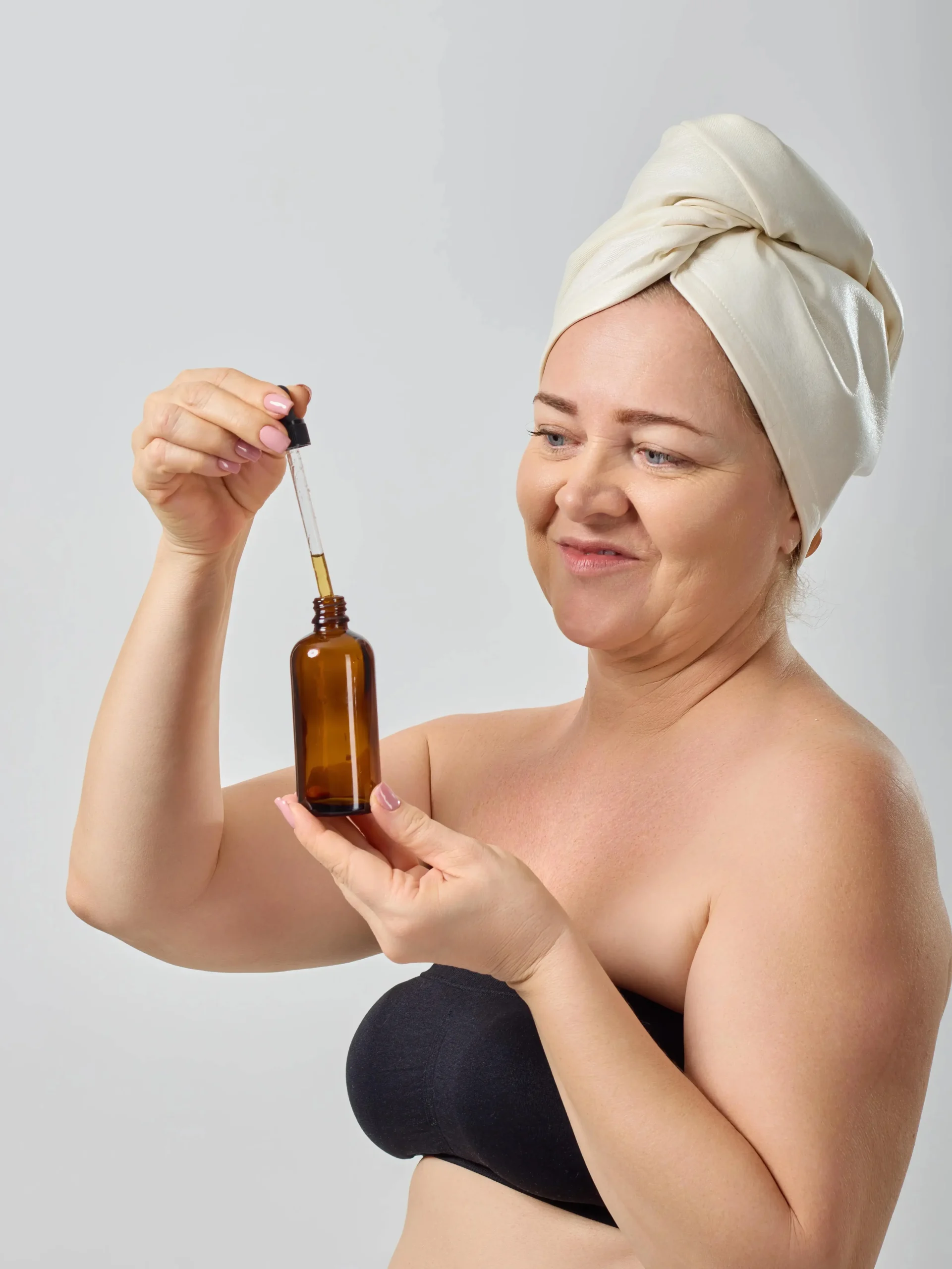
Castor Oil is rich in ricinoleic acid, a unique fatty acid that looks like a prostaglandin (a molecular messenger that reduces inflammation)12. Curious what this has to do with menopausal hair loss?
Well, when applied to the scalp it is believed that Castor Oil may support slowing down inflammation via stimulation of the hair follicle. Plus, it may also help promote blood circulation via nitric oxide,13 supporting better nutrient and oxygen delivery to the hair follicles, potentially helping with hair growth.
Pretty neat, right? Plus, Castor Oil’s antimicrobial and anti-inflammatory properties10B may help combat scalp conditions that might limit hair growth, including dandruff and/or fungal infections.
You see, by maintaining a clean and balanced scalp, Castor Oil is thought to help support an ideal environment for hair growth.
Castor Oil for dry, brittle hair
Struggling with dry, brittle hair? Skip the hot oil treatment of the 90’s and try Castor Oil! This oil is rich in ricinolein, a monounsaturated fatty acid that allows it to act as natural moisturizer for your hair.14
Castor Oil’s thick consistency allows it to penetrate the hair shaft, helping to bring deep hydration to your strands. This helps in restoring moisture that may be lost during menopause, and may help make your hair more manageable and less prone to breakage.
But, remember that with Castor Oil, less is more since it is such a thick, luscious oil.
Makes sense, agreed? Plus, to make your Castor Oil hair routine less messy, you can add in a hair wrap, which is kind of like a Castor Oil Pack for your hair. Intrigued?
Well, Queen of the Thrones® has created a Castor Oil Hair Mask Kit, which means ease and less-mess. The best part? It’s made with high quality organic materials and third-party tested, practitioner-grade Castor Oil.
Homemade Castor Oil Shampoo
Tired of the endless products lining your bathroom counter? Why not try the potential natural benefits of Castor Oil for your hair? Check out this shampoo recipe below, which may help support menopause hair loss!
Homemade Castor Oil Shampoo:
- Select a glass bottle with a capacity of approximately 350mL.
- Incorporate 4 tablespoons of high-quality organic Castor Oil into the bottle.
- Top up the remaining space in the bottle with an all-natural shampoo of your choice.
- Vigorously shake the bottle to ensure thorough mixing before each use.
- Apply the Castor Oil Shampoo during every wash, or as needed.
Note: Allow your hair a few washes to adapt to this formula, depending on your hair type. To have a full body experience, consider combining it with your nightly Castor Oil Pack routine and using a Castor Oil Hair Wrap.
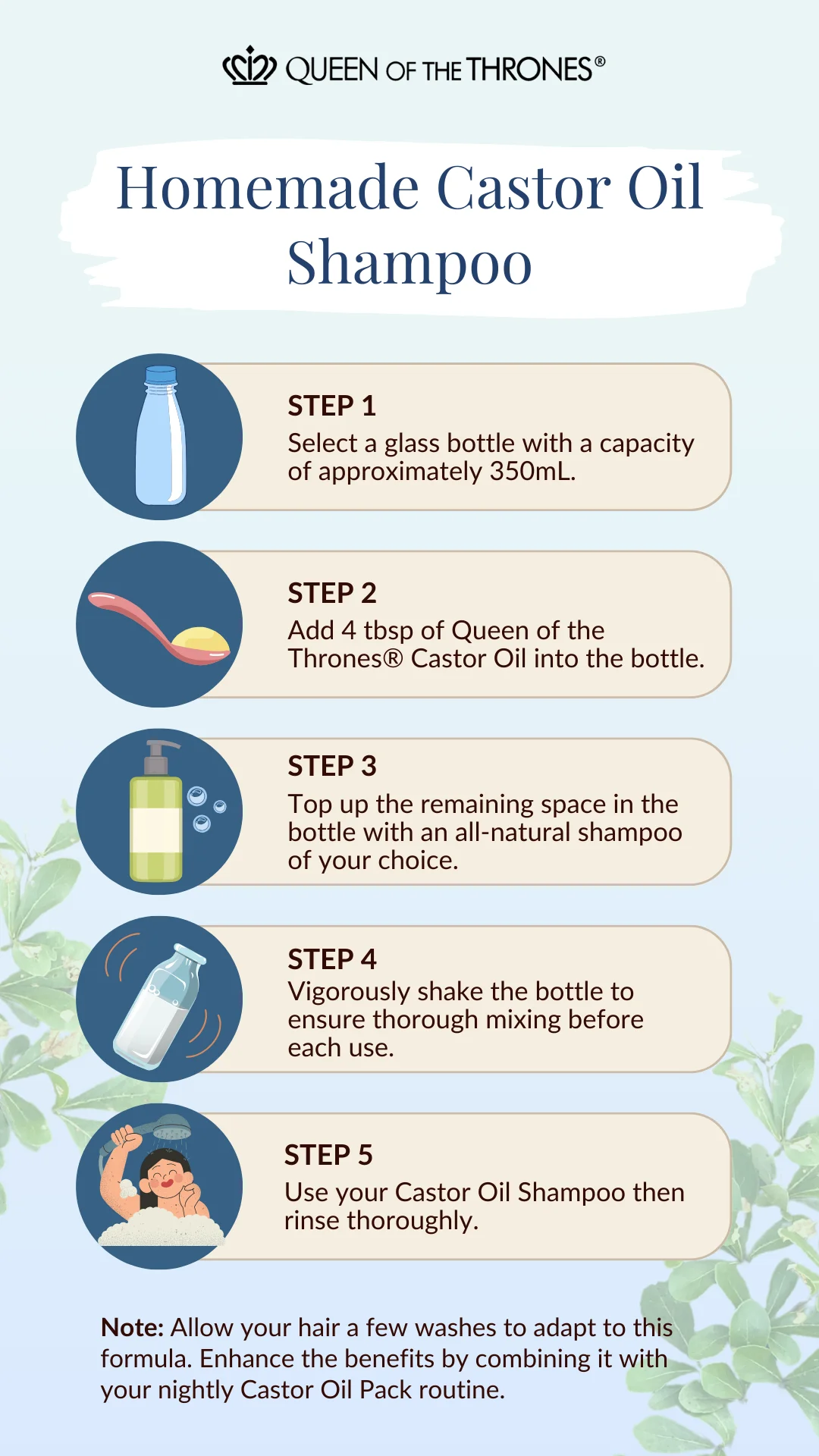
Would you love more Castor Oil recipes for your hair, skin and nails?
Conclusion
So, my friend, in the mirror’s reflection, the changes in your hair may symbolize the evolving chapters of your life, but it doesn’t write your story.
As you incorporate Castor Oil into your hair care routine, envision it not as a solution to dryness, texture, breakage etc., but as a daily affirmation of self-compassion and self-care.
Afterall, the act of massaging Castor Oil into your scalp can become a moment of connection with your own body, a gesture of kindness to the strands that have accompanied you through countless experiences.
So, as you navigate the intricacies of menopause and menopause hair loss, remember that embracing the physical changes, including those in your hair, is a testament to the strength and beauty within every woman.
Are you a practitioner, health coach or wellness influencer? If you’re interested in recommending our easy-to-use tools and practically applying them in your health and wellness professional practice, in clinic, or online with the people you serve, you can join now!
Click here for references
1. Ceylan B, Özerdoğan N. Factors affecting age of onset of menopause and determination of quality of life in menopause. Turk J Obstet Gynecol. 2015 Mar;12(1):43-49. doi: 10.4274/tjod.79836. Epub 2015 Mar 15. PMID: 28913040; PMCID: PMC5558404.
2. Ablon G, Kogan S, Raymond I. A Long-Term Study of the Safety and Efficacy of a Nutraceutical Supplement for Promoting Hair Growth in Perimenopausal, Menopausal, and Postmenopausal Women. J Drugs Dermatol. 2022 Jul 1;21(7):783. doi: 10.36849/JDD.776. PMID: 35816069.
3. Rinaldi F, Trink A, Mondadori G, Giuliani G, Pinto D. The Menopausal Transition: Is the Hair Follicle “Going through Menopause”? Biomedicines. 2023 Nov 14;11(11):3041. doi: 10.3390/biomedicines11113041. PMID: 38002043; PMCID: PMC10669803.
4. Goluch-Koniuszy ZS. Nutrition of women with hair loss problem during the period of menopause. Prz Menopauzalny. 2016 Mar;15(1):56-61. doi: 10.5114/pm.2016.58776. Epub 2016 Mar 29. PMID: 27095961; PMCID: PMC4828511.
5. Brzozowska M, Lewiński A. Changes of androgens levels in menopausal women. Prz Menopauzalny. 2020 Dec;19(4):151-154. doi: 10.5114/pm.2020.101941. Epub 2021 Jan 7. PMID: 33488324; PMCID: PMC7812536.
6. Hasan R, Juma H, Eid FA, Alaswad HA, Ali WM, Aladraj FJ. Effects of Hormones and Endocrine Disorders on Hair Growth. Cureus. 2022 Dec 20;14(12):e32726. doi: 10.7759/cureus.32726. PMID: 36578854; PMCID: PMC9788837.
7. Rajput RJ. Influence of Nutrition, Food Supplements and Lifestyle in Hair Disorders. Indian Dermatol Online J. 2022 Oct 21;13(6):721-724. doi: 10.4103/idoj.idoj_175_22. PMID: 36386748; PMCID: PMC9650738.
8. Marwat SK, Rehman F, Khan EA, Baloch MS, Sadiq M, Ullah I, Javaria S, Shaheen S. Review – Ricinus cmmunis – Ethnomedicinal uses and pharmacological activities.Pak J Pharm Sci. 2017 Sep;30(5):1815-1827. PMID: 29084706
9. McMullen R, Jachowicz J. Optical properties of hair: effect of treatments on luster as quantified by image analysis. J Cosmet Sci. 2003 Jul-Aug;54(4):335-51. PMID: 14528387.
10A-10B. Iqbal J, Zaib S, Farooq U, Khan A, Bibi I, Suleman S. Antioxidant, Antimicrobial, and Free Radical Scavenging Potential of Aerial Parts of Periploca aphylla and Ricinus communis. ISRN Pharmacol. 2012;2012:563267. doi: 10.5402/2012/563267. Epub 2012 Jul 11. PMID: 22919511; PMCID: PMC3418662.
11. Vieira C et al. .Effect of ricinoleic acid in acute and subchronic experimental models of inflammation. Mediators Inflamm. 2000;9(5):223-8 PMID: 11200362
12. Djuric Z, Aslam MN, Simon BR, Sen A, Jiang Y, Ren J, Chan R, Soni T, Rajendiran TM, Smith WL, Brenner DE. Effects of fish oil supplementation on prostaglandins in normal and tumor colon tissue: modulation by the lipogenic phenotype of colon tumors. J Nutr Biochem. 2017 Aug;46:90-99. doi: 10.1016/j.jnutbio.2017.04.013. Epub 2017 Apr 25. PMID: 28486173; PMCID: PMC5503762.
13. Mascolo N, Izzo AA, Autore G, Barbato F, Capasso F. Nitric oxide and castor oil-induced diarrhea. J Pharmacol Exp Ther. 1994 Jan;268(1):291-5. PMID: 8301570.
14. Dias MFRG, Loures AF, Ekelem C. Hair Cosmetics for the Hair Loss Patient. Indian J Plast Surg. 2021 Dec 27;54(4):507-513. doi: 10.1055/s-0041-1739241. PMID: 34984093; PMCID: PMC8719955.

